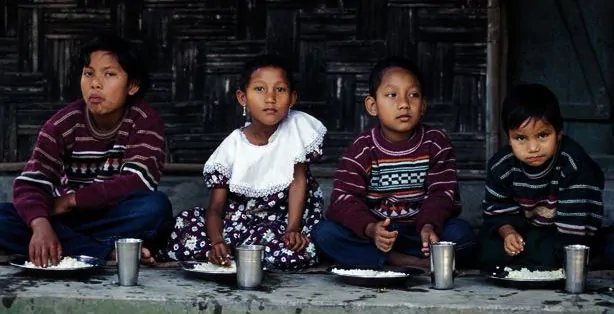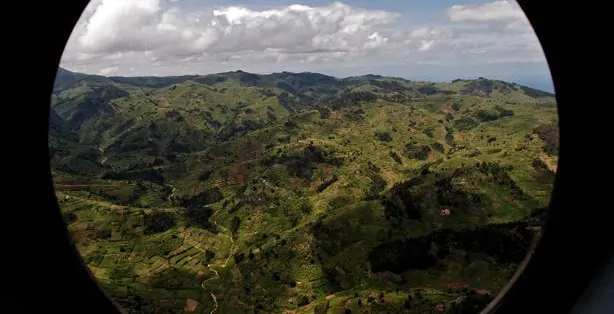
Manihoor squints into the bright Bangladesh sun and wipes her forehead, pausing before stacking more bricks. She wasn’t made for this. She used to have dreams of what her life would be like. They didn’t look like this: hard labor and little food. But her husband died, and she’s alone, providing for their three children.
She knows she’s one of the lucky ones. She has a job working for a home builder. She earns 200 taka, $2.93, for a day of sweat. She knows many others scrape to just make $1 a day around here in the fields. But she can’t do this work each day. Her slight body just won’t; so she rests every fourth day. On those days, they don’t eat.
Even though she earns more than many of her neighbors, she still can’t feed her children on 200 taka a day. Each time she goes to the market, her money seems to buy less and less. It doesn’t buy half of what it did just a year ago. Literally. Many nights and many mornings, Manihoor and her children just don’t eat.
In the past several years, the prices of food globally have been continuously climbing. Worldwide, food prices rose an average of 68 percent between January 2006 and March 2007. In many countries, the price of staples, such as rice and corn, have doubled. These increases take a huge toll on the poor, who already spent around 60 percent of their income on food.
The global food crisis—what the U.N. World Food Programme is calling “a silent tsunami”—has forced more and more people under the poverty line—between 130 to 155 million just between December 2005 and December 2007. In the Philippines since the rise in prices, 14.5 million people are suffering extreme poverty—one in every five families. Riots have broken out across the world in Haiti, Burkina Faso, Egypt and Bangladesh as the people grow hungrier.
Robert Zoellick, the president of World Bank, says this crisis could mean “seven lost years” in the fight against worldwide poverty. According to Zoellick, “While many are worrying about filling their gas tanks, many others around the world are struggling to fill their stomachs, and it is getting more and more difficult every day.” He also notes that the crisis doesn’t just mean the loss of meals, but the stunted intellectual and physical growth for millions of malnourished children. Additionally, in many countries, rising food prices mean more children drop out of school to work.
{sidebar id=5}
Although commodity and fuel prices have recently fallen, it isn’t enough to offset the inflation, and the human consequences of the price explosion linger. Prices still remain higher than they were at the beginning of the price boom, and they are expected to stay 25 percent higher over the next 20 years than they were in the 1990s. Because of the financial crisis, several international banks have stopped providing loans and credit to farmers in the developing world, so there is even less capital available to buy supplies and support their work. According to Hans Zimmer, the manager of global trends for the World Bank’s Development Prospects Group, “The slowdown in developing countries is very significant because the credit squeeze directly hits investments, which were a key pillar supporting the strong performance of the developing world during the past five years.”
In Bangladesh, where the majority of the people work in agriculture, floods and the devastating Cyclone Sidr of 2007 have limited grain production and sent the prices soaring. As a result of this, according to a 2008 study, Bangladeshis spend 87 percent of their food budget on rice, as the prices make meat, vegetables and fruit further out of their reach, heightening risk of malnourishment.
What experts analyze from afar, Manihoor and her kids experience every day, as she tries to maintain her balance on a roof she’s fixing, and as her children try to focus on what the teacher writes on the board at school. Tipu and Fatema, her children, don’t remember the last time they ate meat. They go to school each day without having eaten any breakfast. On the days their mother doesn’t work, they often don’t eat at home at all. Some of their neighbors will collect grains of rice that mice stole and hid in their little holes—gathering whatever they can from the mice for dinner. Other wives will start a pot of water boiling on the fire in front of their homes, hoping the husband will come home with rice to fill it. Many times, there’s only water in the pot.
Tipu and Fatema are blessed, though. They are registered at a Compassion International-assisted project near their home. They visit the project five days a week and get lunch. When the food crisis intensified in the spring of 2008, the project started providing them with a meal six days a week. The children are happy to receive their lunches, but some of the children at Compassion-assisted projects struggle with guilt. Teachers have found them crying as they eat because they know their families are at home with no lunch.
In response to the crisis, Compassion Bangladesh has begun food distribution to families of registered children as an immediate response to the crisis. For 12 weeks, families received five kilograms of rice and one kilogram of lentils each week. The families lined up with old cloth bags and a notebook, in which the date and amount of food is noted. Even in this majority-Muslim country, the families seem to trust the staff, as they line up and wait for their food. At some food distributions, you see mothers and fathers pushing and grabbing. At this one, mothers sit in circles on the ground after they’ve received their rice and talk with their neighbors.
But food distributions can’t be the only response to a food crisis. Domestic agricultural production must be boosted in poor countries that rely on imported food and families need the skills to become self-supporting. In countries such as Bangladesh, El Salvador, Philippines and Tanzania, Compassion is providing various long-term strategies through local churches in affected communities. Families are learning how to keep sustainable home gardens, educational workshops on agricultural practices are being held and seeds for planting are being provided.
U.N. Secretary-General, Ban Ki-moon, calls the food crisis a “moral outrage,” noting that “the nutritional status of many poor, among them millions of children, is further declining.” The Food and Agricultural Organization of the U.N. is appealing to world leaders to find $30 billion a year to eradicate hunger, lest millions more join the 923 million people who are already suffering from malnutrition.
Is not this the time to speak out for the voiceless poor, to choose the kind of sacrifice the Lord requires? For, “is not this the kind of fasting I have chosen: … to share your food with the hungry?” (Isaiah 58:6-7, TNIV).





















